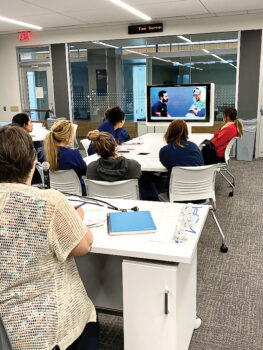
Susan Schweitzer appearing on
television, being interviewed, while
student nurses watch.
Steve Weiss
In January, residents from SaddleBrooke and SaddleBrooke Ranch volunteered to be interviewed in a simulation representing a psychological condition of choice at the University of Arizona School of Nursing, located at the Banner Medical Center. Each volunteer gave three 10-minute interviews with senior nursing students. The interviews were conducted in a small interview room, while the remaining members of the nursing group met in a larger room to watch the audio and video. Thereafter, the nurses and volunteers met to discuss what they experienced.
The volunteers were given two hours of training at the SaddleBrooke Ranch La Hacienda Club, about two weeks before the interview, during which the condition each would represent was chosen. Volunteers were given written material about the condition they were to represent, along with links to videos to watch. The conditions included schizophrenia, bipolar mania, depression, anxiety, post-traumatic stress disorder, and dementia.
Morgan Stock, the Nursing program course co-chair said that this program is important because it allows students to practice interviewing techniques, while allowing for students to make mistakes without harming a patient. This is the third semester in a row that volunteer interviews were conducted. Morgan said that these interviews have decreased the fear and anxiety of the students working with mentally ill clients, while increasing student confidence. The students greatly enjoyed the program and have asked for more interviews to be offered.
This semester, the SaddleBrooke Ranch volunteers included, Anne Brett, Rebecca Williams, Susan Engebretson, Sandy Jessop, Cheryl Margolis, and Steve Weiss. The SaddleBrooke volunteers included Diane Rutkowski, Mary Koop, and Susan Schweitzer. The only requirement to be a volunteer is to understand how a person with the chosen condition will act, and to play the role with excitement. Susan Schweitzer, who was a first time volunteer this semester, said she enjoyed the interviews and is looking forward to being part of the volunteer group next time. Because of the desire to have more interviews, Morgan is looking for more people to volunteer for next semester to represent one of the psychiatric conditions. If interested please contact Morgan at morganstock@email.arizona.edu.
